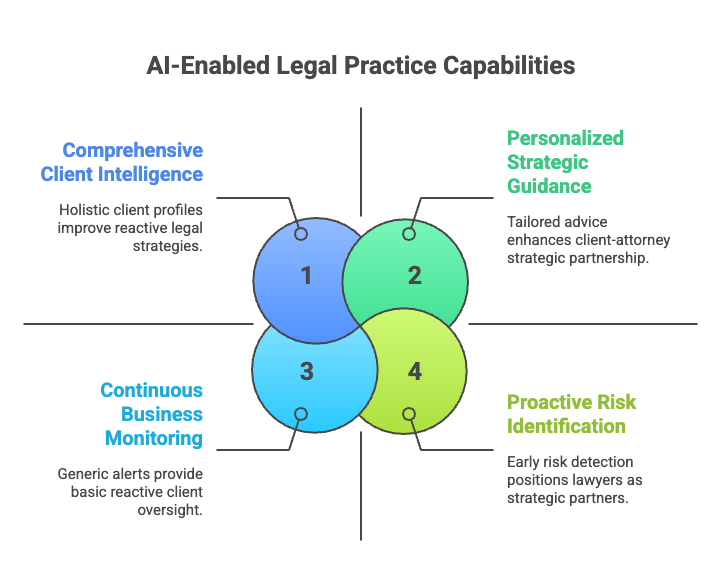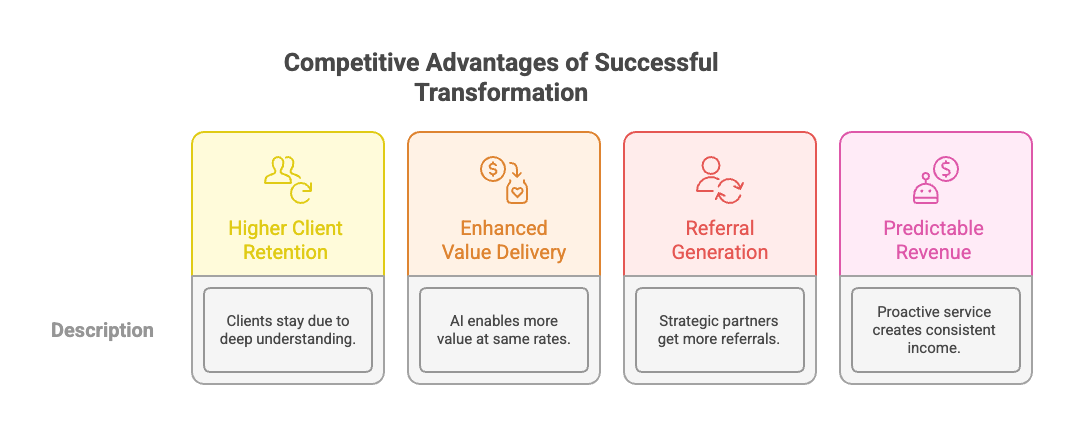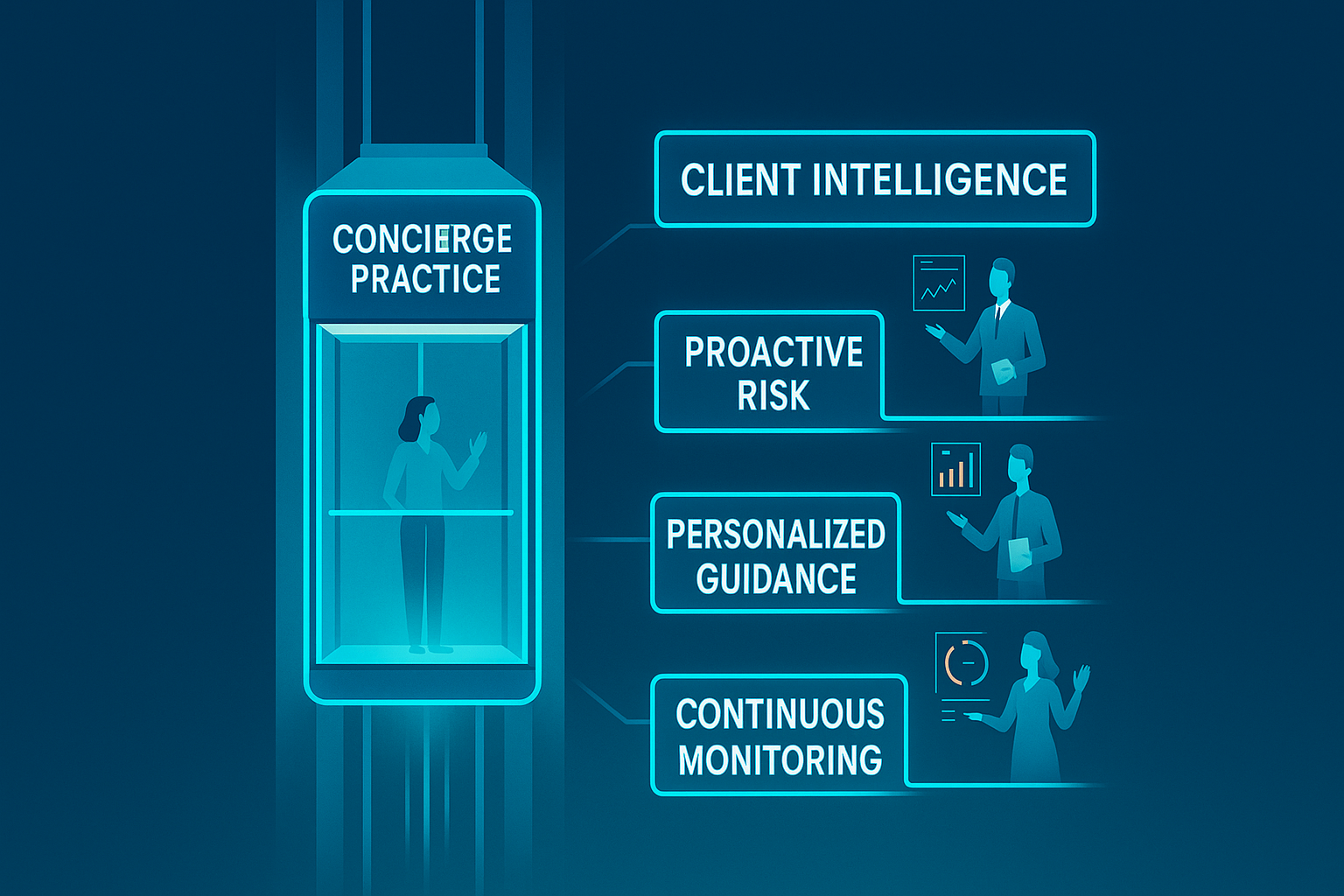I've had a concierge doctor since 2020, when the COVID pandemic made me rethink what healthcare should actually look like.
While most people were struggling to get basic medical appointments and dealing with overwhelmed healthcare systems, my concierge physician was checking in regularly, monitoring my health proactively, and helping me navigate pandemic-related health decisions with personalized guidance based on my complete medical history and risk profile.
But it wasn't just the pandemic response that opened my eyes. Over the past four years, I've experienced what healthcare looks like when the provider has time to truly understand the whole person, not just immediate symptoms. Instead of rushed 15-minute consultations focused on whatever brought me in that day, my doctor spends meaningful time asking questions I'd never heard in traditional medical offices: How does your work stress manifest physically? What patterns do you notice in your energy levels? How are recent business pressures affecting your sleep and exercise routines?
He maintains a comprehensive view of my health that goes far beyond test results and prescription history. He knows my family medical background, understands my lifestyle constraints as an entrepreneur, and proactively suggests adjustments based on subtle changes he notices over time. Last year, He caught early signs of a potential cardiovascular issue during routine monitoring, something that would likely have gone undetected in traditional healthcare until it became a serious problem.
Walking out of every appointment, I realize I haven't just received medical care. I've experienced what healthcare looks like when the provider has the time, tools, and systematic approach necessary to truly understand and serve the whole person.
That ongoing experience got me thinking about a conversation I'd had recently with a managing partner who was frustrated with client retention. "Our work is excellent," he'd said, "but clients still leave for other firms. They seem to view us as interchangeable service providers rather than strategic partners."
The parallel hit me immediately: most law firms are operating like traditional medical practices, responding to immediate problems, managing high caseloads, and rarely having time to understand the broader context of their clients' lives and businesses. Meanwhile, a few forward-thinking firms are beginning to operate more like concierge medicine practices, using AI to create the space and insights necessary to become genuine strategic partners.
Why Concierge Medicine Was Invented: The Power of Focus
The concierge medicine model emerged as a direct response to the unsustainable demands of traditional healthcare. In conventional practices, physicians typically see 200+ patients per week, allowing only 10-15 minutes per appointment. This volume-driven approach forces doctors to focus on immediate symptoms rather than comprehensive health management.
Concierge medicine flipped this model entirely. By limiting their practice to 20-30 patients per week and charging membership fees, these physicians could spend 30-60 minutes per appointment, developing a deep understanding of each patient's complete health picture, lifestyle factors, family history, and personal health goals.
The results speak for themselves: patients in concierge practices show 40% fewer hospitalizations, 65% reduction in emergency room visits, and significantly higher satisfaction scores. More importantly, these physicians catch potential health issues months or years before they would surface in traditional practice.
The transformation isn't just about more time. It's about what becomes possible when a professional can truly understand their client's complete situation rather than just responding to immediate problems.
The Legal Industry's Opportunity: From Reactive to Proactive Client Service
Law firms face a remarkably similar opportunity. Most legal practices operate reactively: clients call when they have problems, lawyers solve those problems, and the relationship goes dormant until the next crisis. This transactional approach commoditizes legal services and makes firms vulnerable to price competition.
But what if lawyers could operate more like concierge physicians? What if they could anticipate client needs, provide proactive guidance, and develop such a deep understanding of their clients' businesses that they become indispensable strategic partners?
The technology to enable this transformation already exists. Artificial intelligence can help lawyers achieve what concierge physicians accomplish through smaller patient loads: comprehensive client intelligence, proactive risk identification, and personalized strategic guidance.
As legal futurist Richard Susskind notes in "The Future of Law": "The most successful lawyers of the future will be those who use technology not to replace human judgment, but to enhance their ability to understand and serve their clients more effectively."
During a recent conversation with a corporate attorney at a mid-size firm, she described her frustration: "I know my clients have business challenges where legal guidance could be valuable, but I only hear about them after decisions have been made or problems have escalated. By then, my options for adding value are limited."
This is precisely the problem AI can solve for legal practice.
Enhancing Access Through Efficiency, Not Higher Fees
It's important to clarify what this transformation means for legal pricing and access to justice. The concierge legal model I'm describing doesn't require charging premium fees like concierge medicine practices. Instead, AI enables lawyers to provide significantly enhanced service at current rates by eliminating the inefficiencies that currently consume so much attorney time.
When AI handles routine document review, legal research, and administrative tasks, lawyers can spend those same billable hours on activities that create more value for clients: understanding their business challenges, identifying opportunities, and providing strategic guidance tailored to their specific situations.
The result isn't higher legal fees. It's better legal service at existing rates. A client paying the same hourly rate receives deeper insights, more proactive communication, and more personalized attention because their attorney isn't spending time on tasks that can be automated.
Stanford Law Professor Mark Lemley, who studies the intersection of technology and legal practice, emphasizes this point: "The goal isn't to make legal services more expensive through technology. It's to make them more effective. When lawyers can focus on what humans do best while letting AI handle routine tasks, clients get better outcomes at the same cost."
This efficiency-driven approach actually has the potential to improve access to justice by making legal services more effective and reducing the total time required to achieve client objectives.
Four Pillars of AI-Enabled Concierge Legal Practice
Based on my work with firms implementing AI-enhanced client service models, four capabilities consistently differentiate transactional service providers from strategic partners:
1. Comprehensive Client Intelligence Integration
Just as concierge physicians maintain holistic patient profiles, leading law firms are using AI to build comprehensive client intelligence that goes far beyond matter files and billing records.
AI systems can continuously monitor and analyze client industry news, regulatory changes, competitor activities, business filings, and even social media presence to build dynamic profiles of each client's business context. Instead of starting every conversation from scratch, attorneys enter client meetings with current understanding of market pressures, growth initiatives, and potential challenges.
The transformation isn't just about better legal outcomes. It is about fundamentally changing how clients view the attorney-client relationship. Instead of seeing their lawyers as reactive problem-solvers, they can now view them as strategic business advisors with unique insights into their industry and regulatory environment.
2. Proactive Risk and Opportunity Identification
Concierge physicians excel at spotting health risks before they become serious problems. Similarly, AI enables lawyers to identify legal and business risks and opportunities before they appear on clients' radar.
AI systems can analyze patterns across regulatory changes, industry trends, competitor activities, and case law developments to surface insights relevant to specific clients. Instead of waiting for clients to ask questions, lawyers can proactively recommend actions that protect or advance client interests.
Consider how this works in practice: An employment law firm uses AI to monitor regulatory developments, industry wage and hour settlements, and workforce trends across their clients' industries. When patterns suggest increased enforcement activity in a particular area, they proactively reach out to affected clients with compliance recommendations rather than waiting for problems to develop.
This proactive approach creates tremendous value for clients while positioning the firm as a strategic business partner rather than a reactive service provider.
3. Personalized Strategic Guidance Based on Business Context
Just as concierge physicians tailor recommendations to individual patient circumstances, AI enables lawyers to customize their guidance based on deep understanding of each client's unique business situation, risk tolerance, and strategic objectives.
AI can analyze a client's business model, competitive position, growth trajectory, and previous legal decisions to provide context-aware recommendations. A regulatory compliance suggestion for a high-growth startup differs significantly from advice for an established public company, even when addressing the same legal issue.
One tax attorney I work with describes how AI has transformed his practice: "Instead of providing generic legal advice, I can now offer guidance that specifically considers my client's business strategy, market position, and risk profile. Clients notice the difference immediately. They're getting legal counsel that feels custom-built for their situation."
4. Continuous Business and Industry Monitoring
Perhaps the most powerful parallel to concierge medicine is AI's ability to provide continuous monitoring of client business environments, alerting lawyers to developments that could affect their clients' interests.
AI systems can track regulatory changes, industry news, competitor activities, market trends, and legal developments, filtering information for relevance to specific clients and practice areas. This creates an early warning system that allows lawyers to reach out with timely insights and recommendations.
The impact on client relationships is profound. When a lawyer calls to discuss how new regulations might affect the client's expansion plans, or reaches out with insights about competitor patent filings, the conversation shifts from reactive problem-solving to strategic partnership.

The Implementation Reality: Starting Your Transformation
The concierge medicine model might sound appealing, but how do law firms actually make this transition? Based on my experience helping firms implement AI-enhanced client service, the most successful transformations follow a measured approach:
Begin with Intelligence Gathering: Start by implementing AI systems that enhance your understanding of existing clients. Before you can provide proactive guidance, you need comprehensive insight into their business contexts, challenges, and opportunities.
Focus on Your Best Clients First: Like concierge medicine practices that maintain smaller patient loads, begin by providing enhanced service to your most valuable client relationships. Use AI to deepen these relationships before expanding the model.
Create Systematic Outreach Protocols: Develop processes for turning AI-generated insights into client communications. The technology provides the intelligence, but lawyers must still deliver the strategic guidance that creates value.
Measure Relationship Depth, Not Just Matter Volume: Traditional law firm metrics focus on billable hours and matter origination. Concierge-model firms track client satisfaction, retention rates, cross-selling success, and the frequency of proactive (versus reactive) client communications.
The Competitive Advantage of Strategic Partnership
The business case for this transformation extends beyond improved client satisfaction. Firms that successfully make this transition achieve several competitive advantages:
Higher Client Retention: Clients rarely leave lawyers who demonstrate deep understanding of their business and provide proactive strategic guidance. The switching costs become prohibitive when the alternative means recreating years of accumulated business intelligence.
Enhanced Value Delivery at Current Rates: Rather than increasing fees, AI enables lawyers to deliver significantly more value at existing price points. By automating routine research, document review, and administrative tasks, attorneys can redirect their billable time toward strategic counsel, relationship building, and personalized guidance that clients truly value. The same hourly rate now buys deeper insights, proactive advice, and more thoughtful service.
Referral Generation: Clients who view their lawyers as strategic business partners refer more frequently and more enthusiastically. These referrals typically involve higher-value, more complex matters.
Predictable Revenue: Proactive service models create more predictable revenue streams. Instead of depending on problems arising, firms build ongoing advisory relationships that generate consistent work.

The Human Element: What AI Cannot Replace
Just as concierge medicine hasn't eliminated the need for skilled physicians, the concierge legal model doesn't diminish the importance of legal expertise and judgment. Instead, it creates more space for lawyers to apply their uniquely human capabilities.
AI handles information gathering, pattern recognition, and initial analysis. Lawyers provide strategic thinking, relationship management, and the judgment that comes from years of experience. The technology creates the conditions for deeper client relationships by eliminating the routine work that previously consumed so much attorney time.
As Georgetown Law Professor William Henderson, who studies legal innovation, observes: "The lawyers who will thrive in the AI era are those who use technology to become more human, not less. Technology should free lawyers to spend more time understanding their clients' businesses, their dreams, their challenges: the things that require empathy and wisdom, not just legal knowledge."
As one partner told me after implementing an AI-enhanced client service model: "For the first time in years, I feel like I'm practicing law the way I always imagined I would. I'm connecting with my clients as people, understanding their business challenges, and helping them navigate complex decisions. The AI handles the information gathering and analysis, which frees me to focus on the strategic guidance that truly matters."
The Path Forward: Your Firm's Concierge Transformation
The legal profession stands at the same inflection point healthcare faced when concierge medicine emerged. Client expectations are rising, competition is intensifying, and technology is creating new possibilities for service delivery.
Firms that embrace the concierge model, using AI to enable deeper client understanding and proactive service, will build sustainable competitive advantages. Those that continue operating reactively will find themselves increasingly commoditized, competing primarily on price rather than value.
The transformation doesn't require revolutionary change overnight. It begins with asking a simple question: How well do we really understand our clients' businesses, challenges, and opportunities beyond the immediate legal matters we're handling?
If the answer reveals gaps, and for most firms, it will, then you're looking at an opportunity to fundamentally strengthen your client relationships while differentiating your practice in ways that competitors cannot easily replicate.
The concierge medicine model proves that when professionals have the tools to truly understand and proactively serve their clients, both sides benefit dramatically. The only question is whether you'll lead this transformation in legal services or follow others who are already making it happen.
What would change about your client relationships if you had the insights and capacity to provide concierge-level legal service? The technology to find out already exists. The only question is whether you're ready to use it.
